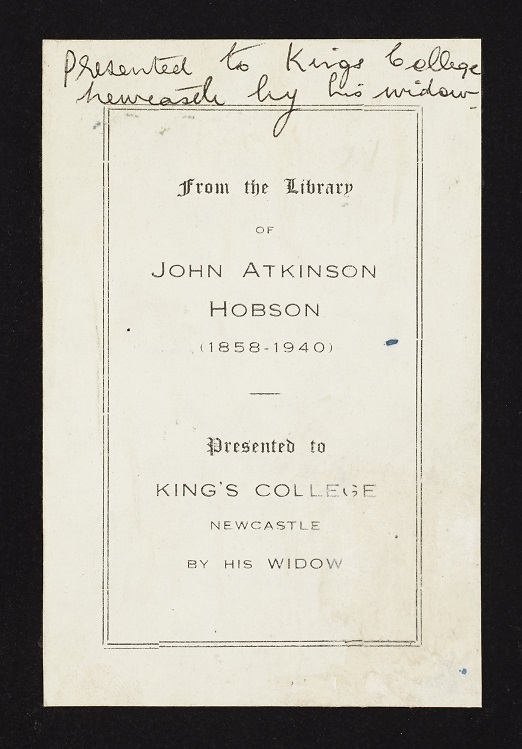
GREEN, Thomas Hill.
Lectures on the principles of political obligation ... with preface by Bernard Bosanquet.
London and New York, Longmans, Green, and Co., 1895.
8vo, pp. xxiv, 252, 24 (publishers’ catalogue of April 1895); with the half-title; some foxing to first quire and in a few places thereafter; original maroon cloth, gilt-lettered spine, neat repairs to head and tail; book label to front pastedown recording the ownership of John Atkinson Hobson, circular ink stamp of King’s College Newcastle Library to head of title and a few other pages, Hobson’s pencilled notes to back free endpaper, other pencilled marginalia, pencil sketches of two heads in profile to back pastedown.

Added to your basket:
Lectures on the principles of political obligation ... with preface by Bernard Bosanquet.
First edition in this form of Green’s lectures, from the library of the social theorist and economist John Atkinson Hobson. Based on lectures given by Green at Oxford in 1879, the text is here reprinted from his Philosophical Works, with the addition of a preface and brief supplement by his student and fellow idealist philosopher Bosanquet. The Lectures contain chapters on freedom, Spinoza, Hobbes, Locke, Rousseau, will, the rights of citizens and the state, and virtues. The continued interest in this text is shown by the publication of a revised edition as recently as 2002.
‘Every important philosopher in Britain between 1880 and 1914 responded in some way to [Green’s] work ... [and] his work was considered seriously in the USA, Italy, and more particularly in Japan ... In addition, he made a pivotal contribution to the professionalization of philosophy in Oxford, encouraging a much more rigorous research-orientated approach to the discipline and widening its sphere of operation to include continental philosophy ... The central category of Green’s political philosophy was citizenship ... The citizen, for Green, was not simply the passive recipient of rights, but rather an active self-realizing being. He viewed all political concepts from this standpoint. Rights, obligations, property, or freedom were devices to allow individuals to realize their powers and abilities. These, and other themes, are explored in his Lectures on the Principles of Political Obligation. The nub of his vision of politics was the provision of an ethical “enabling and educative state”.’ (Andrew Vincent, ODNB).
This important association copy of Green’s work bears a book label recording its ownership by John Atkinson Hobson (1858-1940) and its presentation to King’s College Newcastle by his widow. Hobson is best known as an underconsumptionist who dissented from neoclassical analysis. J.M. Keynes paid him a handsome if belated tribute in his General Theory, acknowledging how far his concept of effective demand had been foreshadowed in Hobson’s work. Hobson did not know Green personally at Oxford (see his Confessions of an economic heretic, 1938, p. 26) and Jules Townsend remarks that it is difficult to gauge Green’s influence on him. But Green, together with Mill, certainly created the intellectual environment into which Hobson entered (Townsend, J.A. Hobson, 1990, p. 21).
Marginal pencil notes by Hobson appear in this copy on several pages, and there is frequent pencil underlining and marking, including occasional question marks. An annotation to Green’s discussion on determination of will reads, ‘A particular determination of the Will has reference to an event in time and as such is like the determination of any natural phenomenon’ (p. 13). On Green’s comment on wrong-doing, Hobson remarks that ‘Here G departs from his Utilit[aria]n standard’ (p. 167). Other annotations relate to Green’s discussion of state punishment, moral depravity, and voluntary taxation. On the final free endpaper, Hobson has written in pencil his own index to particular passages in Green’s text.

